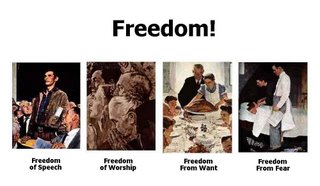I'm going to limit myself to one argument that has particular
significance today. Then as now, people argued the real problem was
America's presence and that if we would just withdraw, the killing
would end.
The argument that America's presence in Indochina was dangerous
had a long pedigree. In 1955, long before the United States had entered
the war, Graham Greene wrote a novel called, "The Quiet American." It
was set in Saigon, and the main character was a young government agent
named Alden Pyle. He was a symbol of American purpose and patriotism --
and dangerous naivete. Another character describes Alden this way: "I
never knew a man who had better motives for all the trouble he caused."
After America entered the Vietnam War, the Graham Greene argument
gathered some steam. As a matter of fact, many argued that if we pulled
out there would be no consequences for the Vietnamese people.
In 1972, one antiwar senator put it this way: "What earthly
difference does it make to nomadic tribes or uneducated subsistence
farmers in Vietnam or Cambodia or Laos, whether they have a military
dictator, a royal prince or a socialist commissar in some distant
capital that they've never seen and may never heard of?" A columnist
for The New York Times wrote in a similar vein in 1975, just as
Cambodia and Vietnam were falling to the communists: "It's difficult to
imagine," he said, "how their lives could be anything but better with
the Americans gone." A headline on that story, date Phnom Penh, summed
up the argument: "Indochina without Americans: For Most a Better Life."
The world would learn just how costly these misimpressions would be.
In Cambodia, the Khmer Rouge began a murderous rule in which hundreds
of thousands of Cambodians died by starvation and torture and
execution. In Vietnam, former allies of the United States and
government workers and intellectuals and businessmen were sent off to
prison camps, where tens of thousands perished. Hundreds of thousands
more fled the country on rickety boats, many of them going to their
graves in the South China Sea.
Three decades later, there is a legitimate debate about how we got
into the Vietnam War and how we left. There's no debate in my mind that
the veterans from Vietnam deserve the high praise of the United States
of America. (Applause.) Whatever your position is on that debate, one
unmistakable legacy of Vietnam is that the price of America's
withdrawal was paid by millions of innocent citizens whose agonies
would add to our vocabulary new terms like "boat people," "re-education
camps," and "killing fields."
There was another price to our withdrawal from Vietnam, and we can
hear it in the words of the enemy we face in today's struggle -- those
who came to our soil and killed thousands of citizens on September the
11th, 2001. In an interview with a Pakistani newspaper after the 9/11
attacks, Osama bin Laden declared that "the American people had risen
against their government's war in Vietnam. And they must do the same
today."
His number two man, Zawahiri, has also invoked Vietnam. In a letter
to al Qaeda's chief of operations in Iraq, Zawahiri pointed to "the
aftermath of the collapse of the American power in Vietnam and how they
ran and left their agents."
Zawahiri later returned to this theme, declaring that the Americans
"know better than others that there is no hope in victory. The Vietnam
specter is closing every outlet." Here at home, some can argue our
withdrawal from Vietnam carried no price to American credibility -- but
the terrorists see it differently.
We must remember the words of the enemy. We must listen to what they
say. Bin Laden has declared that "the war [in Iraq] is for you or us to
win. If we win it, it means your disgrace and defeat forever." Iraq is
one of several fronts in the war on terror -- but it's the central
front -- it's the central front for the enemy that attacked us and
wants to attack us again. And it's the central front for the United
States and to withdraw without getting the job done would be
devastating. (Applause.)
If we were to abandon the Iraqi people, the terrorists would be
emboldened, and use their victory to gain new recruits. As we saw on
September the 11th, a terrorist safe haven on the other side of the
world can bring death and destruction to the streets of our own cities.
Unlike in Vietnam, if we withdraw before the job is done, this enemy
will follow us home. And that is why, for the security of the United
States of America, we must defeat them overseas so we do not face them
in the United States of America. (Applause.)
Geo. W Bush, Aug 22, 2007
Powered by ScribeFire.






No comments:
Post a Comment